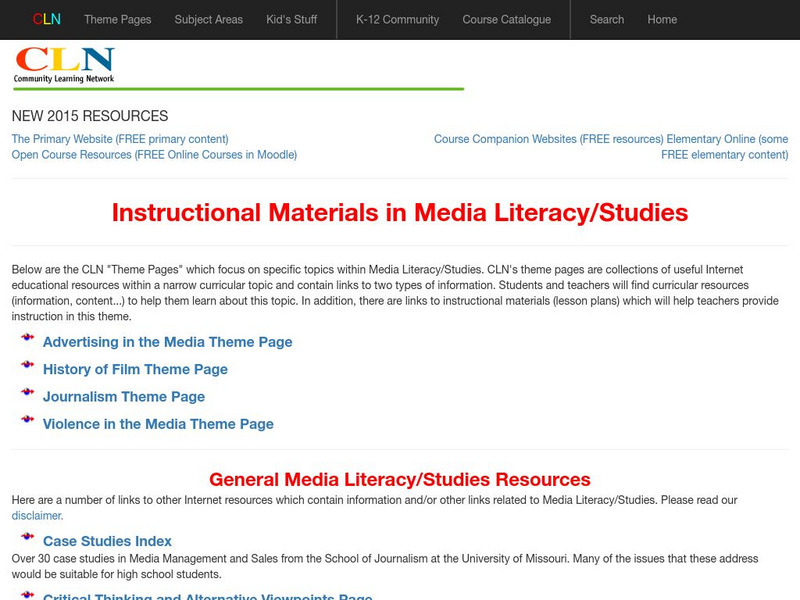Common Sense Media
Common Sense Media: Education: Social Media and Digital Footprints: Our Responsibilities
Social media can be a place to connect, learn, and, most of all, share. But how much do kids know about what they're sharing - and not just about themselves but each other? Help learners think critically about their digital footprints on...
Community Learning Network
Cln: Instructional Materials in Media Literacy Studies
CLN "Theme Pages," focus on specific topics within Media Literacy/Studies. CLN's theme pages are collections of useful Internet educational resources within a narrow curricular topic and contain links to two types of information....
PBS
Pbs Learning Media: Common Sense Education: Identifying High Quality Sites
Learn how to "test before you trust" the sites and information found on the Web in this lesson plan and student handout from Common Sense Education. Assessing what you find on the Web is an essential skill for today's students. Use this...
Common Sense Media
Common Sense Media: Connecting With Digital Audiences
Code-switching is the action of changing your language, behavior, or appearance based on who you're with or where you are. In this lesson, students will apply the idea of code-switching to how they use phones and other devices in and...
Common Sense Media
Common Sense Media: Education: Trillion Dollar Footprint: Grades 6 8
Students learn that they have a digital footprint, which can be searched, shared, and seen by a large, invisible audience. They then learn that they can take some control over their digital footprint based on what they post online. They...
Rock and Roll Hall of Fame
Rock & Roll Hall of Fame: Sti Lesson 28 the Electric Hearth
As educators, the goal of developing learners into discerning, critical viewers may enable them to negotiate with more confidence through the treacherous waters of today's multimedia. Studying the various viewpoints as expressed in...
PBS
Pbs Learning Media: Point of View: Who, Me? Biased?: Understanding Implicit Bias
In this interactive lesson, learners explore the extent to which society (and they themselves) may discriminate based on factors they're not even aware of, implicit biases. Why haven't laws been enough to eliminate discrimination? After...
Rock and Roll Hall of Fame
Rock & Roll Hall of Fame: Sti Lesson 32: The John Travolta Syndrome
The songs and movies of modern times have had a major influence on fashion. Coincidentally, many of these important fashion-influencing films of recent times had one thing in common: John Travolta. From the white leisure suits ofSaturday...
John F. Kennedy Center
The Kennedy Center: Multi Media Hero Analysis
Using what they learn about how heroes are depicted in art, literature, and music, young scholars create their own definition of a hero, and then write an essay based on a hero they wish to research.
C-SPAN
C Span Classroom: Teaching About Standardized Testing
Comprehensive multi-media learning materials plus lesson plan on the debate over standardized testing in schools allows students to debate for themselves whether or not Congress should continue to require annual standardized tests for...
PBS
Pbs Teachers: Sports Screeners
Examine how physical activity and sports are depicted in movies and on television. Hypothesize how images of physical activity and sports depictions in entertainment can influence young people's attitudes and behaviors.
BSCS Science Learning
Bscs: Drug Abuse and the Adolescent Brain
This module focuses on the science that explains the effects that drugs have on the brain and, by extension, a person's thoughts, feelings, and behaviors. Specifically, it focuses on the adolescent brain. Adolescents may be more...


